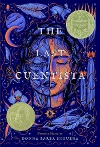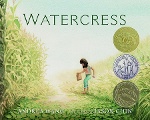The Year in Words and Pictures—and Stories
As the speeches and profiles arrived for this year’s ALA Awards special issue, we noticed a theme: so many of them address the idea of learning from others, especially those who came before. That’s part of the work of acceptance speeches, of course, as creators give credit to their influences. But it also resonated with us for another reason: letting people learn from one another is part of why we share stories.



As the speeches and profiles arrived for this year’s ALA Awards special issue, we noticed a theme: so many of them address the idea of learning from others, especially those who came before. That’s part of the work of acceptance speeches, of course, as creators give credit to their influences. But it also resonated with us for another reason: letting people learn from one another is part of why we share stories.
In the Caldecott-winning Watercress, a mother finally shares a tale from her difficult past, which helps her daughter to understand and appreciate her heritage and family. Newbery winner The Last Cuentista is about the erasure of memories — all except those of storyteller protagonist Petra. Unspeakable: The Tulsa Race Massacre, which won both the Coretta Scott King Author and Illustrator awards, presents a part of history that went untold for too long, even preserving the late Floyd Cooper’s memories from his grandfather’s firsthand accounts of that horrific event. Children’s Literature Legacy Award winner Grace Lin is well-known for weaving additional stories throughout her main narratives; and for further evidence, see her superlative May/June Horn Book Magazine special issue cover about the Newbery centennial.
We realize we’re preaching to the choir here, but stories and storytelling have power. As we’ve seen recently in news-making book challenges, book bans, alarmist rhetoric, and restrictive legislation, this power can be threatening to those who fear, resist, or resent change. We’ve said this before, and we’re happy to be able to say it again: the ALA awards are showing some encouraging trends away from a dominant narrative. Once again, this year saw a welcome overlap between the “oldest and best-known” awards and some of the newer, identity-based awards.
Watercress, which won the Caldecott Medal for Jason Chin and a Newbery Honor for Andrea Wang, was the Asian/Pacific American Librarians Association (APALA) Picture Book winner. Donna Barba Higuera’s The Last Cuentista won the Newbery Medal and the Pura Belpré Children’s Author Award. Unspeakable, in addition to its CSK sweep for author Carole Boston Weatherford and illustrator Cooper, earned a Caldecott Honor (the first ever posthumous Caldecott recognition) and a Sibert Honor.
Noteworthy overlap also included Malinda Lo’s Last Night at the Telegraph Club, winner of the National Book Award (NBA) for Young People’s Literature, which was the APALA Youth Literature and the Stonewall Young Adult Literature winner, along with receiving a Printz Honor. Firekeeper’s Daughter by Angeline Boulley garnered Printz and Morris wins and an American Indian Library Association (AILA) Young Adult Honor; while a Newbery Honor and a Stonewall Children’s Literature Award went to Too Bright to See by NBA finalist Kyle Lukoff — the first openly trans author to receive Newbery recognition. Kekla Magoon’s Revolution in Our Time, also an NBA finalist, received a Printz Honor and a CSK Author Honor.




These books aren’t just the best at portraying the experience of a particular identity, they’re also among the best. (And, to toot our own horn, Watercress and Unspeakable were also Boston Globe–Horn Book honorees, that award’s lone criterion being “excellence.”) Additionally, nearly every major award that is not identity-based was either well-represented by (Caldecott, Sibert) or dominated by (Newbery, Printz) non-white or otherwise marginalized creators. (Geisel’s showing underscores the need for even more early readers by and about non-white people.)
Another welcome development this year came from behind the scenes, with small and/or independent publishers earning big prizes. Both the Newbery and the Caldecott winners were published by small houses. Levine Querido (just launched in 2019) published The Last Cuentista, along with Newbery honoree A Snake Falls to Earth, AILA Young Adult winner Apple: Skin to the Core and honoree Elatsoe, and Batchelder honoree The Sea-Ringed World, all by creators from historically marginalized groups. Holiday House published Watercress, Sydney Taylor Picture Book Award winner The Passover Guest, Pura Belpré Youth Illustrator honoree Bright Star, and Geisel honoree I Hop.
 Carolrhoda (an imprint of Lerner) published Unspeakable. Abrams produced the Sibert-winning The People’s Painter, CSK Illustrator honoree Soul Food Sunday, Pura Belpré Youth Illustrator honoree May Your Life Be Deliciosa and Children’s Author honoree Child of the Flower-Song People, and AILA Young Adult honoree Hunting by Stars. The YALSA Award for Excellence in Nonfiction for Young Adults winner, Ambushed!, was published by Calkins Creek (an imprint of Astra). In this age of conglomerate publishing, it’s nice to see the little(r) houses outside of “the big six” (now five, but maybe soon to be…four?!) succeed and even thrive.
Carolrhoda (an imprint of Lerner) published Unspeakable. Abrams produced the Sibert-winning The People’s Painter, CSK Illustrator honoree Soul Food Sunday, Pura Belpré Youth Illustrator honoree May Your Life Be Deliciosa and Children’s Author honoree Child of the Flower-Song People, and AILA Young Adult honoree Hunting by Stars. The YALSA Award for Excellence in Nonfiction for Young Adults winner, Ambushed!, was published by Calkins Creek (an imprint of Astra). In this age of conglomerate publishing, it’s nice to see the little(r) houses outside of “the big six” (now five, but maybe soon to be…four?!) succeed and even thrive.
It’s also nice to see some outside-the-box wins in terms of age range and format. While the Caldecott went to all picture books this year (as has occurred in recent years after the blips of The Invention of Hugo Cabret in 2008 and This One Summer in 2015), other major awards with some flexibility in criteria were refreshingly diverse in age range and format. The Newbery was a mix of YA fiction, middle-grade prose and verse novels, and a picture book. CSK authors were an even split of picture book and YA creators. The Sibert recognized five picture books plus a YA narrative nonfiction thriller.
And…let’s hear it for weirdness! A.S. King, whose 2021 book Switch perfectly, surrealistically captured our collective “lost COVID-19 year,” alongside a body of work that consistently expands readers’ minds and subverts our narrative expectations, won the Margaret A. Edwards Award for her lifetime achievements in writing for young adults.
In her own award speech (see page 69), Nikki Grimes, winner of the Coretta Scott King–Virginia Hamilton Award for Lifetime Achievement (and who herself strives for “real stories about real people,” their darkness and light) makes a direct connection to her late friend Virginia Hamilton — a poignant reminder of storytellers whose work we cherish and whose lives we celebrate and may still mourn. The list of creators we’ve lost over the last year is much too long: Arnold Adoff, Ashley Bryan, Eric Carle, Beverly Cleary, Floyd Cooper, Lois Ehlert, Bernette Ford, Eloise Greenfield, Steve Jenkins, Norton Juster, Patricia MacLachlan, Gary Paulsen, Jerry Pinkney, and so many others whose stories will live on in readers’ minds and hearts.
The losses we suffered make the prospect of gathering in person in DC after two years of remote celebrations feel all the more meaningful. ALA Annual might be a true bacchanalia in the joyful reunion of colleagues and friends and the bliss of being surrounded by physical books. But the gathering will also be bittersweet, tempered by notable absences. Those, perhaps immunocompromised, who won’t be there because of the continuing risk of COVID-19. Those, like Floyd Cooper, who have joined the ancestors and won’t be there to accept their awards. Perhaps these events will be bittersweet for the foreseeable future; certainly, the absences are a sharp reminder of how much we owe those on whose shoulders we all stand. Yet there is such progress to be celebrated; so much good literature; so many brilliant book creators; and such a stalwart community working to make even more progress. To borrow the words of Martha Brockenbrough (from her profile of Donna Barba Higuera on page 36), we are a community “wrapped in love and story” — something to cherish as we gather, reflect, pay homage, and celebrate.
From the July/August 2022 issue of The Horn Book Magazine: Special Issue: ALA Awards. For speeches, profiles, and articles, click the tag ALA 2022.
 Single copies of this special issue are available for $15.00 including postage and may be ordered from:
Single copies of this special issue are available for $15.00 including postage and may be ordered from:
Kristy South
Administrative Coordinator, The Horn Book
Phone 888-282-5852 | Fax 614-733-7269
ksouth@juniorlibraryguild.com
RELATED
ALREADY A SUBSCRIBER? LOG IN
We are currently offering this content for free. Sign up now to activate your personal profile, where you can save articles for future viewing.







Add Comment :-
Be the first reader to comment.
Comment Policy:
Comment should not be empty !!!